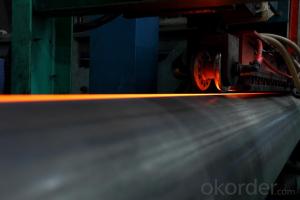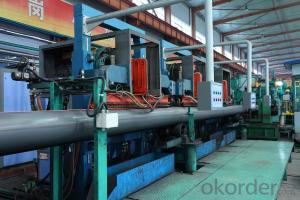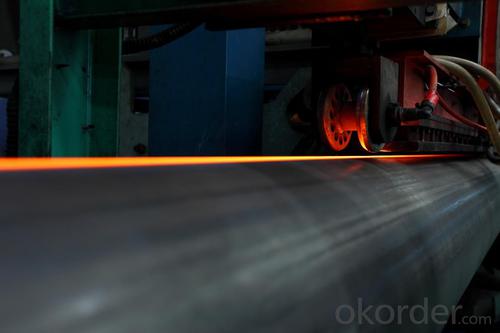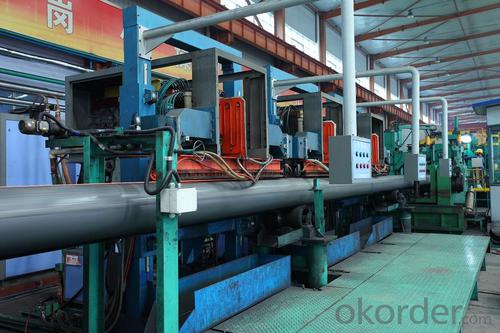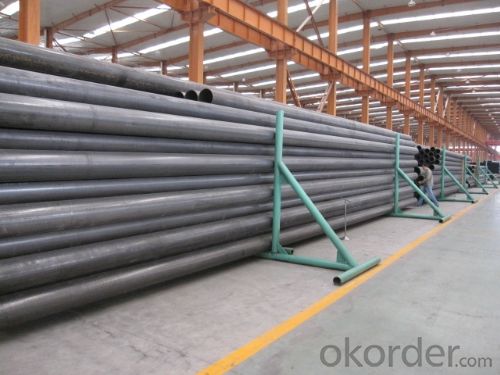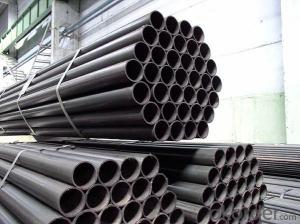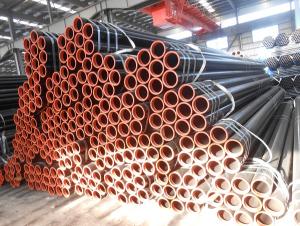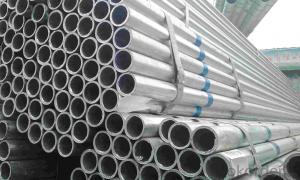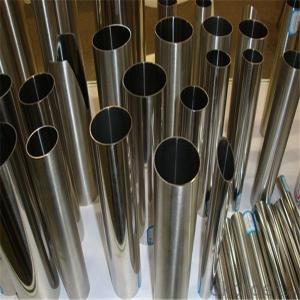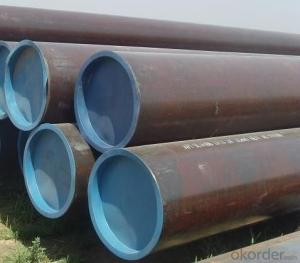Nature gas longitudinal seam steel line pipe
- Loading Port:
- China Main Port
- Payment Terms:
- TT OR LC
- Min Order Qty:
- -
- Supply Capability:
- -
OKorder Service Pledge
OKorder Financial Service
You Might Also Like
Specification
Size | OD 19mm-710mm 1/2"--28" inch | |
Thickness | 2.5-50mm | |
Executive standards | GB/TB163-2008, GB/T3087-2008, API 5L, API 5CT, ASTM A106, | |
ASTM A53, BS1387-1958 | ||
Steel grade | 10#, 20#, 20G, 35#, 45#, 16Mn(Q3458), 27SiMn, DZ50,12Cr1MoV, A106, ST52, ST45, Gr8. | |
Finish | Galvanization ,bared, oiled, black paint or as per the client's requirement,beveled edges, anti-rust oil and caps on both ends, 3PE,FBE | |
Delivery time | 10-30 days after receiving the deposit, some size is available | |
Payment item | 30% advance payment, the balance will be against the BL copy | |
LC irrevocable at sight, | ||
Marketing | South East Asia, Africa, European, South AMERICAN, USA, Australia,middle east etc. | |
Application | Structural pipe, oil or gas transportation pipe, fluid pipe, line pipe, drill pipe, boiler pipe, etc | |
Packing | PP, PE, BUNDLE, CAPS ON BOTH ENDS, AS PER THE CLIENT'S REQUIREMENT | |
Certificate | API, ISO9001 | |
Standard | BS, JIS, GB, DIN, ASTM, API | |
Port | Xingang port Tianjin China |
Dimension for thread seamless steel pipe
Chinese Standard | American Standard | German Standard | |
10# | A53-A | St37 | DIN1626 |
A106-A | St37-2 | DIN17175 | |
A179-C | St35-8 | DIN17175 | |
20# | ASTM A106-B | St45-8 | DIN17175 |
ASTM A53-B | St42-2 | DIN1626 | |
ASTM 178-C | St45-4 | DIN1629/4 | |
45# | ASTM A 1045 | CK45 |
|
16Mn | A210-C | St52 | DIN1629/3 |
St52.4 | DIN1629/4 | ||
37Mn5 | J55 | ||
- Q: How are steel pipes used in the telecommunications network infrastructure?
- Steel pipes have a wide range of applications within the telecommunications network infrastructure. Underground cable conduits are one of the main uses of steel pipes in this industry. These conduits are responsible for safeguarding telecommunications cables from various external factors, including moisture, rodents, and physical damage. By providing exceptional strength and durability, steel pipes ensure the long-term protection of these cables. Furthermore, steel pipes are indispensable in the construction of telecom towers and antenna masts. These structures must possess robustness and resilience to withstand adverse weather conditions. Steel pipes offer the necessary strength, stability, and durability required for telecom towers to support antennas and other equipment. Additionally, their ease of assembly enables efficient deployment and maintenance of the network infrastructure. Additionally, steel pipes are crucial in the installation of fiber optic cables. Fiber optic cables transmit data at high speeds through the use of light signals. To ensure optimal performance, it is imperative to protect these cables from any external interference. Steel pipes serve as conduits for fiber optic cables, effectively shielding them from electromagnetic interference and other potential disruptions. To summarize, steel pipes play a vital role in the telecommunications network infrastructure. They are utilized for the installation of underground cable conduits, construction of telecom towers, and protection of fiber optic cables. The strength, durability, and versatility of steel pipes make them an ideal choice for guaranteeing the reliability and functionality of telecommunications systems.
- Q: What are the different shapes available for steel pipes?
- There are several different shapes available for steel pipes, including round, square, rectangular, and oval shapes.
- Q: What is the average lifespan of steel pipes?
- The average lifespan of steel pipes can vary depending on various factors such as the quality of the steel used, the environment in which they are installed, and the maintenance and care they receive. However, on average, well-maintained steel pipes can last anywhere from 50 to 100 years or more.
- Q: Can steel pipes be used for underground cable protection?
- Yes, steel pipes can be used for underground cable protection. Steel pipes offer durability, strength, and corrosion resistance, making them suitable for protecting cables from external factors such as moisture, chemicals, and physical damage. Additionally, steel pipes can be coated or galvanized to provide further protection against rust and corrosion.
- Q: What are the different types of steel pipe flanges?
- There are several different types of steel pipe flanges, including slip-on flanges, weld neck flanges, socket weld flanges, threaded flanges, blind flanges, lap joint flanges, and orifice flanges. Each type has its own unique design and purpose, catering to specific applications and requirements in various industries.
- Q: What are the common factors affecting the flow capacity of steel pipes?
- The flow capacity of steel pipes can be affected by several common factors. Firstly, the diameter of the pipe plays a crucial role. A larger diameter allows for a greater flow capacity because there is more area for the fluid to pass through. Secondly, the length of the pipe also affects flow capacity. Longer pipes tend to have higher frictional losses, which can decrease the flow capacity. Thirdly, the internal surface roughness of the steel pipe can impact flow capacity. Rough surfaces create more friction, resulting in a lower flow rate. Conversely, smooth pipes allow for smoother flow and higher flow capacity. The properties of the fluid being transported through the steel pipe are another important consideration. Factors such as viscosity, temperature, and density can all influence the flow rate. For example, highly viscous fluids have a lower flow capacity compared to less viscous fluids. Additionally, pressure drop along the length of the pipe is a significant factor. Friction, bends, and restrictions can all cause pressure losses, resulting in a lower flow capacity. The material of the steel pipe and its wall thickness also play a role. Different materials have varying properties that can impact flow rates. Moreover, thicker walls can reduce the internal diameter of the pipe, leading to a lower flow capacity. Lastly, the design and layout of the pipe system, including the presence of fittings, can impact flow capacity. Fittings such as valves, elbows, and tees can cause additional pressure drops and turbulence, reducing the overall flow rate. Considering these factors is essential when designing or evaluating a steel pipe system to ensure optimal flow capacity and efficiency.
- Q: What are the advantages of using steel pipes in the manufacturing of appliances?
- There are several advantages of using steel pipes in the manufacturing of appliances. Firstly, steel pipes are extremely durable and can withstand high pressures, making them ideal for applications that require strength and resilience. Secondly, steel pipes have excellent corrosion resistance, ensuring that the appliances will last longer without succumbing to rust or degradation. Additionally, steel pipes have a smooth interior surface, which minimizes friction and allows for efficient flow of fluids or gases within the appliances. Lastly, steel pipes are readily available and cost-effective, making them a practical choice for appliance manufacturers.
- Q: How to make the steel pipe spray paint is not easy to fall off?
- You're not usually advised to do it yourself, because you can't do it yourself. General powder coating, spray before the treatment is very strict, to be high temperature baking, and their spraying are dry paint, it does not add hardening agent, that is, the surface dry, but not hard, not wear-resistant. So don't scrape off the paint, or you'll look good after spraying, and it will be ugly in a few days,.If you really like to look good, you can buy some stickers back to paste, without affecting the appearance..
- Q: Can steel pipes be used for water treatment plants?
- Yes, steel pipes can be and are commonly used in water treatment plants. Steel pipes have several advantages such as high strength, durability, and resistance to corrosion, making them suitable for conveying and transporting water in water treatment processes.
- Q: What are the common factors affecting the lifespan of steel pipes?
- Steel pipes can have their lifespan significantly reduced by various common factors. One primary factor is corrosion, which occurs when the steel is exposed to moisture, chemicals, and harsh environmental conditions, leading to rust and deterioration over time. Another determinant of the lifespan of steel pipes is the quality of materials used in their manufacturing. Higher-grade steel with better resistance to corrosion and degradation generally lasts longer compared to lower-quality materials. Proper installation and regular maintenance are crucial for ensuring the longevity of steel pipes. Inadequate support or improper alignment during installation can cause premature failure, while neglecting routine maintenance, such as cleaning and inspection, can speed up the degradation process. The operating conditions also play a role in the lifespan of steel pipes. Factors like temperature, pressure, and the type of fluid or gas being transported can affect the pipes' integrity. Extreme conditions, such as high temperatures or exposure to corrosive substances, can significantly reduce their lifespan. Excessive mechanical stress, including vibration, impact, or heavy loads, can weaken steel pipes over time. If not properly managed or accounted for during the design and installation process, this stress can lead to cracking, deformation, or even complete failure. The surrounding environment also influences the lifespan of steel pipes. Exposure to harsh weather conditions, such as extreme temperature variations or frequent freeze-thaw cycles, can expedite the deterioration process. Pollutants or aggressive substances in the surrounding soil or water can also contribute to the degradation of steel pipes. To ensure the durability and reliability of steel pipes, it is essential to consider and address factors such as corrosion, material quality, installation and maintenance practices, operating conditions, mechanical stress, and environmental factors. By doing so, the lifespan of steel pipes can be extended.
Send your message to us
Nature gas longitudinal seam steel line pipe
- Loading Port:
- China Main Port
- Payment Terms:
- TT OR LC
- Min Order Qty:
- -
- Supply Capability:
- -
OKorder Service Pledge
OKorder Financial Service
Similar products
Hot products
Hot Searches
Related keywords
